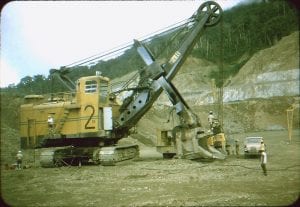Our insatiable appetite for energy and gadgets is destroying communities around the world. Extraction has victims, even if they’re out of sight and out of mind until those victims are us.
Modern life in our industrial culture depends upon extracting a great many resources not only from the natural world, but sometimes from each other. We don’t like to think about it, but extraction has victims. Often, those victims are obvious; who is unaware of the dangers of living and breathing around refineries or drinking water in fracking country? However, even industries we consider benign or “sustainable” impose significant costs upon the human and natural communities where those resources are mined and refined. Let’s take a quick look at some of the collateral damage that results from maintaining the good life.
Growing oil on trees instead of drilling for the dead stuff underground sounds like it would be an all-around win, but palm oil extraction has victims. Governmental mandates to include a percentage of biofuels in the motor vehicle mix incentivized producers not only to turn edible corn into ethanol for cars, but to clearcut rainforests in order to plant oil palm plantations for biodiesel. This move was supposed to effectively tackle the looming threat of climate change, but leveling so many trees released vast amounts of carbon into the atmosphere. Much like the policy whereby the EU creates “clean energy” by burning American trees, the carbon pollution is not counted and therefore appears neutral when it is not. What’s more, the plantations grab orangutan habitat as well as farmland that provided food and income for local people instead of multinational conglomerates.
Greta Thunberg’s North American tour is inspiring people to consider the implications posed by current climate science. Rather than advocating solutions like a solar grid and electric cars, however, we also need to consider the implications of those technologies. Cobalt, lithium, copper, manganese, and rare earth mineral extraction has victims. In the past decade, most large companies mining minerals needed to manufacture batteries, solar panels, and wind turbines have been linked to allegations of abuses including land rights infringement, corruption, violence, child and slave labor, and other human rights violations.
As the Amazon burns, Indigenous people in Brazil and throughout the world are particularly vulnerable to the ravages of extractive industries. The first several months of Jair Bolsonaro’s administration oversaw a significant increase in reports of illegal exploitation of natural resources, invasion and damage to Indigenous land. In July, gold miners murdered 68-year-old Emyra Wajãpi, a leader of the Wajãpi tribe, who live in the state of Amapá in Northern Brazil. He was found stabbed and dumped in a river. Afterwards, armed miners invaded the Indigenous village of Yvytotõ, forcing residents to flee.
Northern Chile used to be a place of lagoons and pastures where people grazed the llamas that supported their livelihoods. Now it’s a salty desert, thanks to batteries. Lithium extraction has victims in the Atacama. The mining companies suck up more fresh water from the aquifers below than is sustainable, producing “sustainable” infrastructure for the industrial world while depriving Indigenous communities the ability to support themselves through small scale farming. They already had to give up their animals. What next?

Extraction has victims among First Nations in North America as well. The Bakken shale oil boom brought temporary workers, mostly men, to rural areas in North Dakota and throughout the oilfield. According to tribal police and local activists, this influx led to more violent crime, sex trafficking, and cases of rape. While the 2012 rape and murder of Sherry Arnold, a Caucasian teacher, attracted the national spotlight, over 500 Native women have been murdered or gone missing in the Bakken region and along the Keystone XL pipeline route, events that have gone underreported. Oil firms and lobbyists have had some success in criminalizing protests by Indigenous people and allies motivated to protect the land and water, and two activists from Iowa face 110 years in prison after admitting they sabotaged the pipeline after the Standing Rock protests failed to turn it away.
The examples go on and on and on. All around the world, extraction has victims, and the technology that the industrial world is counting on in order to maintain the fossil fueled status quo or combat climate chaos while still enjoying all of its toys results in the immiseration, destitution, imprisonment, and death of communities and land defenders who find (or put) themselves in the way of the all-devouring machine. Success stories, like the island of Bougainville’s Coconut Revolution, are few and far between. How far are people willing to go to protect their lives and livelihoods from industrial culture? Will those of us living in the belly of the beast find it within themselves to reduce their demands for extraction and consumption to levels that fit the available resource base without resorting to coercion, destruction, and murder? The coming years, and the hearts of people everywhere, will tell.
Related: Liberalism as a Fashion Statement


Join the conversation!